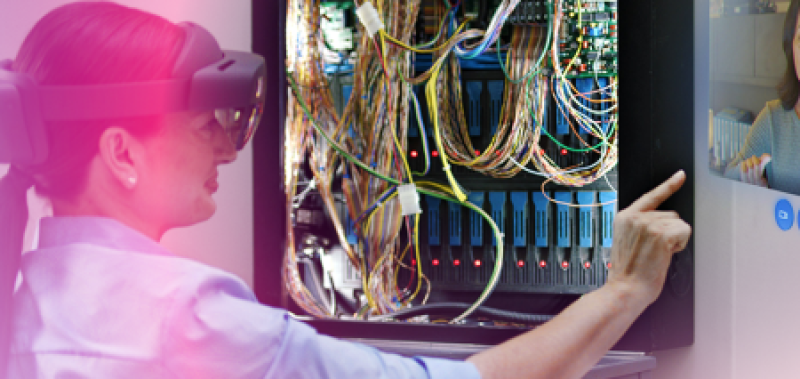Microsoft inaugurated a center of excellence for energy known as Microsoft Energy Core in the UAE. The initiative and facility aims to accelerate digital transformation, build coalitions for responsible innovation, and drive skilling initiatives in the energy sector. The center will also help contribute to environmental sustainability of the industry, a key element of the company’s global commitment to climate innovation.
The virtual launch event was attended by Omar Sultan Al Olama, UAE's minister of state for artificial Iitelligence (AI), and Samer Abu Ltaif, president for Microsoft Middle East and Africa, along with several industry customers and partners.
“The UAE has always been at the forefront of innovation, with our ambition to become a role model for the world,” Al Olama said. “The UAE National Strategy for Artificial Intelligence sits at the heart of it, and our partnership with Microsoft contributes to this effort. The Energy Core will accelerate our collaboration to focus on sectors such as the energy industry to enable digital transformation and address core areas such as increasing efficiency, environmental sustainability, and policymaking in the region, leading to a positive future for generations to come.
“As we continue empowering people and businesses to achieve more, we do so with a firm commitment to building a more sustainable future,” Ltaif said “The energy industry faces significant challenges, and the Microsoft Energy Core brings effective coalitions and leverages AI in an endeavour to address them. We are encouraged by the growing number of energy companies’ commitments towards transitioning to cleaner energy and lowering carbon emissions, but they cannot do it alone. Businesses, governments, and civil society can rise to the challenge while meeting the world’s growing energy demands.”
Launched in collaboration with 10 founding partners including ABB, Accenture, AVEVA, BakerHughesC3.ai, Emerson, Honeywell, Maana, Rockwell Automation, Schlumberger, and Sensia, Microsoft Energy Core covers four pillars.
The first is enabling digital transformation, where Microsoft and its partners will establish digital innovation capacities by creating a world-class energy executive briefing and solutions development center. Second, through building coalitions with energy operators, power and utility organizations, renewable energy companies, academic institutions, and industry bodies, the Energy Core pursues strategic collaborations through a vibrant industry board that drives thought leadership for responsible innovation, across the energy value chain.
Closing the skills gap and enhancing employability is the third pillar of the Energy Core, empowering energy industry professionals to spearhead their organizations’ digital transformation agendas by skilling and reskilling for digital readiness. The Energy Core is launching an AI Academy as a building block to equip the industry workforce with the necessary AI skills. This extends to undergraduate and post-graduate students as well to prepare a future ready workforce.
And fourth, as part of Microsoft’s global commitment, the facility will focus on sustainability and societal impact by actively pursuing the development of innovative solutions built on AI to solve the most-pressing challenges of the energy industry. Microsoft has committed to ambitious environmental sustainability goals. By 2030, Microsoft plans to be carbon negative, and, by 2050, the company expects to remove all the carbon it has emitted since it was founded in 1975. Moreover, 100% of the energy for the carbon-emitting electricity consumed by its data centers, buildings, and campuses will shift to renewable energy by 2025. Microsoft is also helping customers reduce their carbon footprints and coinnovating to develop low-carbon solutions, and it continues to invest in programs such as AI for Earth, which puts AI in the hands of those working to solve global environmental challenges.
“The Microsoft Energy Core is part of our unwavering commitment towards capacity-building, empowering innovation, and driving prosperity and growth. Together, with our customers and partners we will reshape the future of the energy industry and drive a positive impact in our communities,” Ltaif said.

